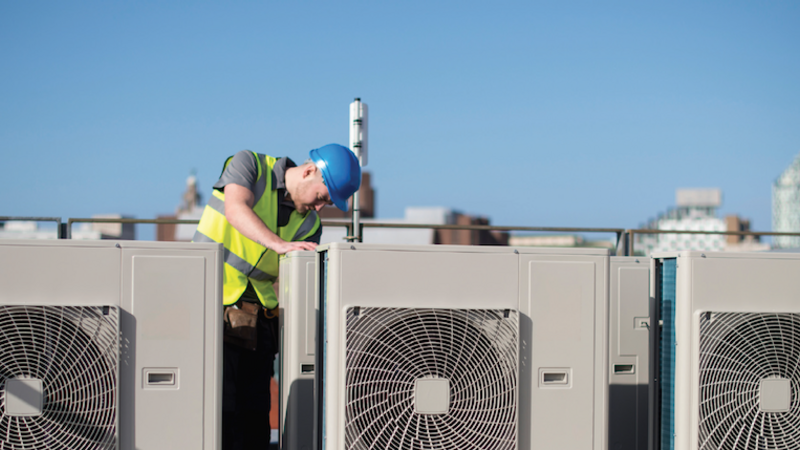Connecting...
Cleaning and maintaining an air conditioning unit or system
over 7 years ago Empty Rob Bryan

Cleaning and maintaining an air conditioning unit or system is vital in not only ensuring the health of people within a building but also in improving energy efficiency, lowering operating costs and cutting carbon emissions.
What happens when an air conditioning system is not properly maintained?
Dust, dirt, viruses, mould and bacteria can accumulate in the various parts of an air conditioning unit. This can have an effect on the health of those living or working in the building.
A poorly maintained or defective air conditioning unit or system can cause increased maintenance and energy costs, higher carbon emissions, and a failure to comply with regulations.
The legislation: Maintenance and cleaning
Anyone who manages or controls the technical operation of an air conditioning system – for example, the owner or manager of a building, a tenant, or a facilities management company – has statutory obligations and duties of care regarding its operation, maintenance and cleaning.
The Workplace (Health, Safety and Welfare) Regulations 1992 also state that employers in the UK must ensure that workspaces are sufficiently ventilated, and that an appropriate temperature is maintained. Where this is achieved through the use of an HVAC unit or system, employers must ensure that these remain in good working order through checks, maintenance and repairs.
Air conditioning installers and engineers are specially trained in the cleaning and maintenance of units and systems. They also have expertise in the use of R32, an HFC refrigerant classified in EU regulations as flammable. Because R32 has a lower GWP (global warming potential) than its alternative, R410A, it is increasingly being used in the HVAC industry.
The core legislation is laid out in the EU Energy Performance of Buildings Directive (EPBD), which is covered by the following statutory requirements:
F-Gas Inspections
Fluorinated greenhouse gases (F-gases) can have a greater effect on global warming than carbon dioxide. This regulation is supported in the UK by the Fluorinated Greenhouse Gases Regulations 2009 (SI 2009/261). It is designed to reduce emissions of F-gases by ensuring the safe operation of air conditioning, refrigeration and heat pump systems.
The regulation states that an inspection must be carried out by an F-Gas certified engineer every three months for systems over 300kg refrigerant, every six months for more than 30kg and 12 months for 3kg.
British Standard
BS EN 15004 also requires an F-Gas certified engineer to carry out an inspection, in this case looking at all air conditioning units or systems which have an asset number. This aims to fulfil the EC Regulation 82/2006 which requires the checking of leakages, completion of repairs, and recovery of gases to prevent any escape of gases. A log must be kept which includes maintenance history, and records of the addition or removal of refrigerants.
Energy Performance Certificate (EPC)
This aims to improve the efficiency of air conditioning systems, as well as lowering energy usage, operating costs and carbon emissions. It must be carried out by a registered energy assessor on all buildings larger than 500msq which have been occupied since April 2008. The certificate remains valid for ten years.
Energy efficiency inspection
This assesses the energy performance of an air conditioning unit or system. It must be carried out by a registered energy assessor within five years of an air conditioning system or unit being installed, including any that are not covered by the EPC regulations mentioned above.
- Arranging an inspection
The responsible person must ensure that inspections are carried out in accordance with the regulations, and provide any relevant documentation when requested. They must arrange safe access to equipment, including to hidden areas or components requiring the system to be turned off. They may also be asked to accompany the assessor during the inspection.
Arrangements should be made to ensure the safety of those working or living in the building during an inspection, and to keep disruption to a minimum.
- The inspection
The assessor will look at the refrigeration and air moving equipment, including the condition of filters, heat exchangers, and fans. They will assess the system controls, looking for any faults or misuse, incorrect settings, and sensors placed in poor locations. They will also look at the size of the system and its suitability for the space in which it is used.
The inspection will not assess the risks to public health, although the assessor should inform the responsible person of any potential issues, and confirm that the necessary checks have been made to eliminate the risk of Legionella as laid out in the Health (Legionella) Regulations 2001.
Following the inspection, the assessor will provide a report, which must be kept in a safe place. The report will include:
- How efficient a system is and how it can be improved
- Any faults, and actions to rectify them
- The adequacy of the size of the system or unit
- Advice and recommendations on measures, both inexpensive and requiring more investment, to improve energy efficiency and reduce operating costs. There is no legal requirement to act upon this.
- A valid report reference number
A penalty charge notice of £300 may be issued for failure to commission, keep or provide a report. An additional penalty of £200 may be applied for failure to provide, when requested, a copy of the report. Not having a report could also cause problems during the sale or lease of a building.
